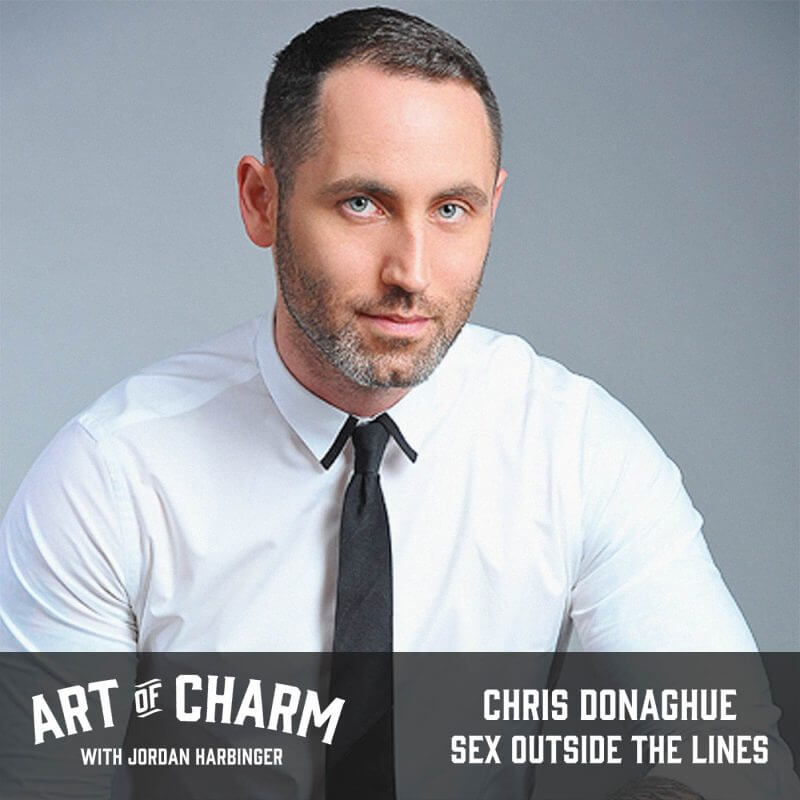Dr. Chris Donaghue (@ChrisDonaghue) is one of only a few hundred people in the entire world certified as a sex therapist, so you’ll want to hear what he has to say about the myths of sexual dysfunctions, accepting your desires (even if they don’t align with societal expectations), and how to develop healthy sex and dating habits.
The Cheat Sheet:
- Cultures that embrace sexuality have lower rates of teen pregnancy and STDs, and pornography-tolerant societies have lower rates of sex crimes.
- What constitutes healthy sex?
- Believe it or not, there’s no right (or wrong) way to have an erection.
- Is sex addiction a myth?
- The concept of gender “norms”: we’re doing it wrong.
- And so much more…
[aoc-subscribe]
For its content matter, this episode of The Art of Charm is prudently — and perhaps prudishly — marked as NSFW (not safe for work) for the majority of our listeners. This is because, in the United States, sex is a topic that’s typically addressed in hushed whispers, behind closed doors, and in private. But even if you’re not an American, your own nation of origin probably isn’t completely devoid of its own share of hangups.
Here to talk about his new book, Sex Outside the Lines: Authentic Sexuality in a Sexually Dysfunctional Culture, sex therapist Dr. Chris Donaghue seeks to help us shun the societal myths that bar us from dating well, feeling good about our desires, being comfortable in our gender roles, and enjoying healthy sex lives.
More About This Show
Do you know the difference between a sex therapist and a sexologist? Dr. Chris Donaghue can tell you, because he happens to be both.
“A sexologist is someone who has pretty much dedicated their entire career to focusing on the science of sex, the cultural anthropology of sex, the sociality of sex — it’s someone who studies sex,” says Chris.
But as a sex therapist, he’s also licensed to provide honest-to-goodness clinical therapy to those in need. In Chris’ case, he specializes in individual and couples sex and marital therapy, as well as sexual compulsivity, sexual anorexia, sexual dysfunctions, and non-traditional sexuality, identities, and relationships. He also runs healthy sexuality therapy groups. The “doctor” isn’t just some colorful honorific made up to add spice to his title, either; Chris has put in the hours to become a PhD, LCSW (Licensed Clinical Social Worker), and CST (Certified Sex Therapist).
In a country like the United States, where sex is usually regarded as taboo, private, and somewhat dangerous in comparison to attitudes expressed by the more sexually liberal nations of Europe, Chris aims to normalize the way we talk about it and deal with it as a society. He believes — and has the statistics to support it — that the more open a society is about sex, the less it suffers the ills of misinformation and fear.
“In our sex-phobic culture where we teach abstinence-only sex education, we have higher rates of STDs, [and] higher rates of unwanted and teen pregnancy,” says Chris. “Cultures where they’re allowed to see it on television and allowed to talk about it, they learn how to talk about it because they talk about it, and they’re able to set boundaries and ask important questions and they have lower rates of all of that.”
“Cultures that are more comfortable and supportive of pornography have lower sex crimes, as well,” he adds. “Countries that are anti-porn have higher sex crimes, and it’s probably similar correlation/causation where, if you have outlets to sexuality and you understand how to speak and ask for what you want and you’re allowed to have it, you’re going to have a better relationship with it.”
So now that we’re talking about sex, let’s delve into the backbone of Chris’ work and try to answer some of the most common questions he gets and misconceptions he has to deal with.
What Is Healthy Sex?
While Chris admits that psychology has some universal definitions of what healthy sex is, he tries to consider it on a case-by-case basis. But here a couple of constants he will agree with:
- Healthy sex is consensual. “It’s always the number one foundation,” says Chris.
- Healthy sex is informed. “You understand what sex is going to mean,” says Chris, “what’s going to happen, and you’re willing to deal with the consequences of that.”
What’s a Better Model for Dating and Marriage?
“What most therapists and manuals and media — because media is a massive socializer for us — it’s telling me that you need to put yourself first, and you need to look out for yourself,” says Chris. “That’s awesome, but that’s anti-relationship. Relationship is actually about a fusion, and somewhat of a codependence with another person, and you actually want to think in opposite terms. And you want to think, ‘How is this impacting my partner and how is this impacting us?’ And we don’t do that.”
“If you’re going to be in a relationship, you can’t say ‘I’; you have to think in terms of ‘us’ and ‘we.’ That’s what comes in my office in my couples and sex therapy clients. Two people come in, and they’re only thinking about what they want and what they need, and there’s no relationship. I try to get them to a place where they’re thinking, ‘What does our relationship need?’ and ‘What about us?’ and kind of fuse them and push them together.
The Myth of Sexual Dysfunctions
“People talk about erectile dysfunctions,” says Chris, “and a lot of guys have anxiety. ‘Will I last? How long will I last? Will I be able to get hard, and will I be able to stay hard?’ And it completely changes what sex is even about. Why do we have sex?”
Some would say because it’s a biological urge. Others would say it’s fun and it feels good. Others would say it’s to develop and further intimate relationships.
“None of those inherently, consistently need your penis to be hard at all times. And yet we’ve moved away from what [some would say] is a pleasure model, a connection based model, we’ve moved away. Now we’re just thinking about performance. And it’s not about performance.”
“Bad sex is sex where people are only worried about performance. Good sex is [asking] ‘How did that feel? Did I feel connected? Did I get off?’ And so there’s no right way for your penis to operate, and I alleviate a lot of stress on guys when I tell them there’s no such thing as coming too soon, because there’s no right amount of time to wait until you come. There’s no healthy, right amount of time that you’re supposed to last. Everyone is different, and that’s okay.”
Listen to this episode of The Art of Charm in its entirety to learn more about the myth of sex addiction, problems with society’s gender norms and roles, dating authentically (and how this relates to those gender norms), and lots more.
THANKS, CHRIS DONAGHUE!
Resources from this episode:
Sex Outside the Lines by Chris Donaghue
The Art of Charm bootcamps
You’ll also like:
-The Art of Charm Toolbox
-Best of The Art of Charm Podcast
On your phone? Click here to write us a well-deserved iTunes review and help us outrank the riffraff!




